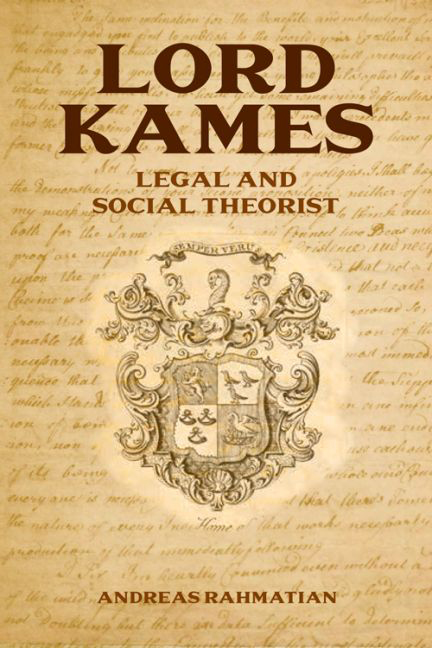Book contents
- Frontmatter
- Contents
- Preface
- Bibliography of Works by Lord Kames and Abbreviated References
- I Introduction
- II Aesthetics
- III Moral Philosophy I: Principles
- IV Moral Philosophy II: Development
- V Political Philosophy, Anthropology and Commerce
- VI Legal History, Legal Science and Comparative Law
- VII Property
- VIII Equity
- IX Obligations and Enforcement
- X Criminal Law
- XI Lord Kames's Influence on Some of the Founders of the United States
- XII A Critical Conclusion
- Bibliography
- Index
IX - Obligations and Enforcement
Published online by Cambridge University Press: 12 September 2017
- Frontmatter
- Contents
- Preface
- Bibliography of Works by Lord Kames and Abbreviated References
- I Introduction
- II Aesthetics
- III Moral Philosophy I: Principles
- IV Moral Philosophy II: Development
- V Political Philosophy, Anthropology and Commerce
- VI Legal History, Legal Science and Comparative Law
- VII Property
- VIII Equity
- IX Obligations and Enforcement
- X Criminal Law
- XI Lord Kames's Influence on Some of the Founders of the United States
- XII A Critical Conclusion
- Bibliography
- Index
Summary
Promises, Covenants, Contractual Obligations and their Philosophical Foundations
Kames's legal theory of obligations largely grew out of his conception of equity. As usual, Kames combines this theory with a conjectural history of the development of contractual obligations which are the product of a development of moral principles as well as of legal forms and phenomena.
Conjectural history of promises and covenants
The importance of moral principles grows with the refinement of human society. That also applies to promises and covenants: in fully evolved, established societies they have full effect, but in less developed societies (Kames of course says, ‘among barbarians’) promises and covenants carry not much weight, and that is worsened by the fact that the language at that stage also lacks sophistication. Societies pass through the ages of hunting and of herding, and then reach the stages of agriculture, and finally, of commerce. Commerce really started with barter. The introduction of money made the barter evolve into an exchange of goods against money, that is, a sale, but ‘without a previous covenant’. Thus at that level of evolution Kames perceives this transaction as a factual exchange only without the realisation of an underlying obligation of the parties that could be separated conceptually and in time from that factual transfer/exchange. This understanding of an obligation emerged when society became more complex and there ‘came to be a demand for interposed persons’, brokers, go-betweens, agents, merchants, who ‘take care to be informed of what is redundant in one corner, and of what is wanted in another’, what one would probably characterise as the information function of the market today. Only then, ‘and no sooner’, did the use of covenants become recognised, because without previous agreements the business of a merchant cannot be carried on. In Roman law the sale was a recognised contract because commerce had already been advanced in Rome, something that also becomes apparent from the existence of the ‘location’, and the ‘contract of society’ or partnership. Besides there existed only the solemn promise or stipulatio in Roman law which was enforceable. Among ancient peoples simple promises only become recognised (enforceable) with the ‘progress in social life’ when their usefulness was realised, Kames argues, and he refers to Herodotus for historical examples of solemn acts that were to give weight to promises.
- Type
- Chapter
- Information
- Lord KamesLegal and Social Theorist, pp. 287 - 299Publisher: Edinburgh University PressPrint publication year: 2015



